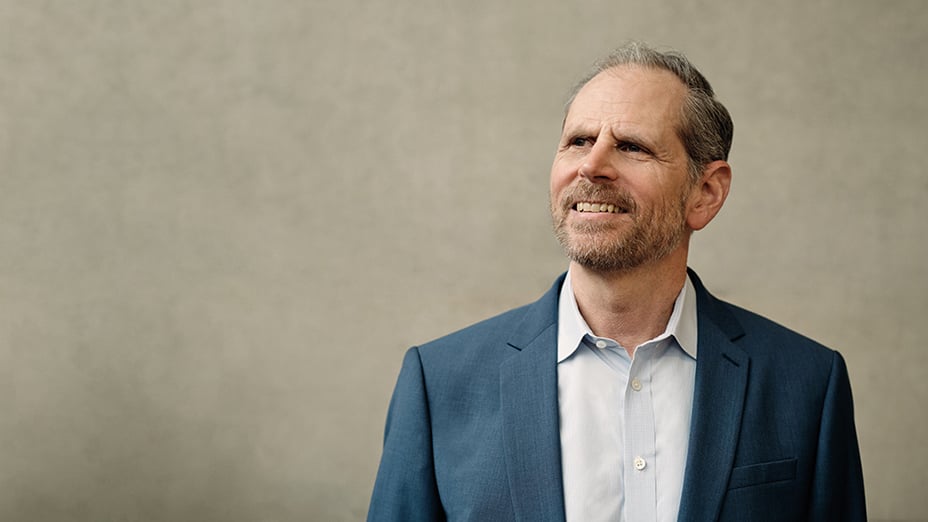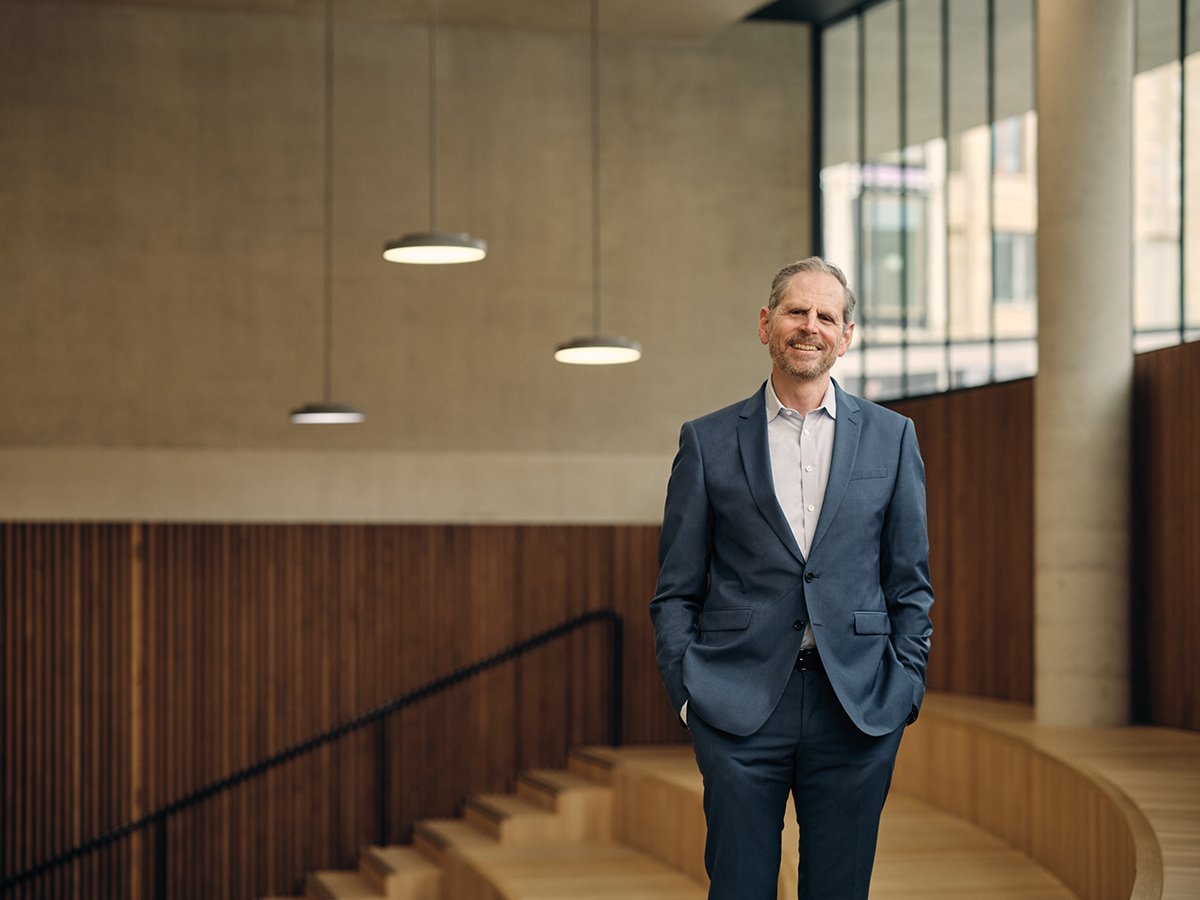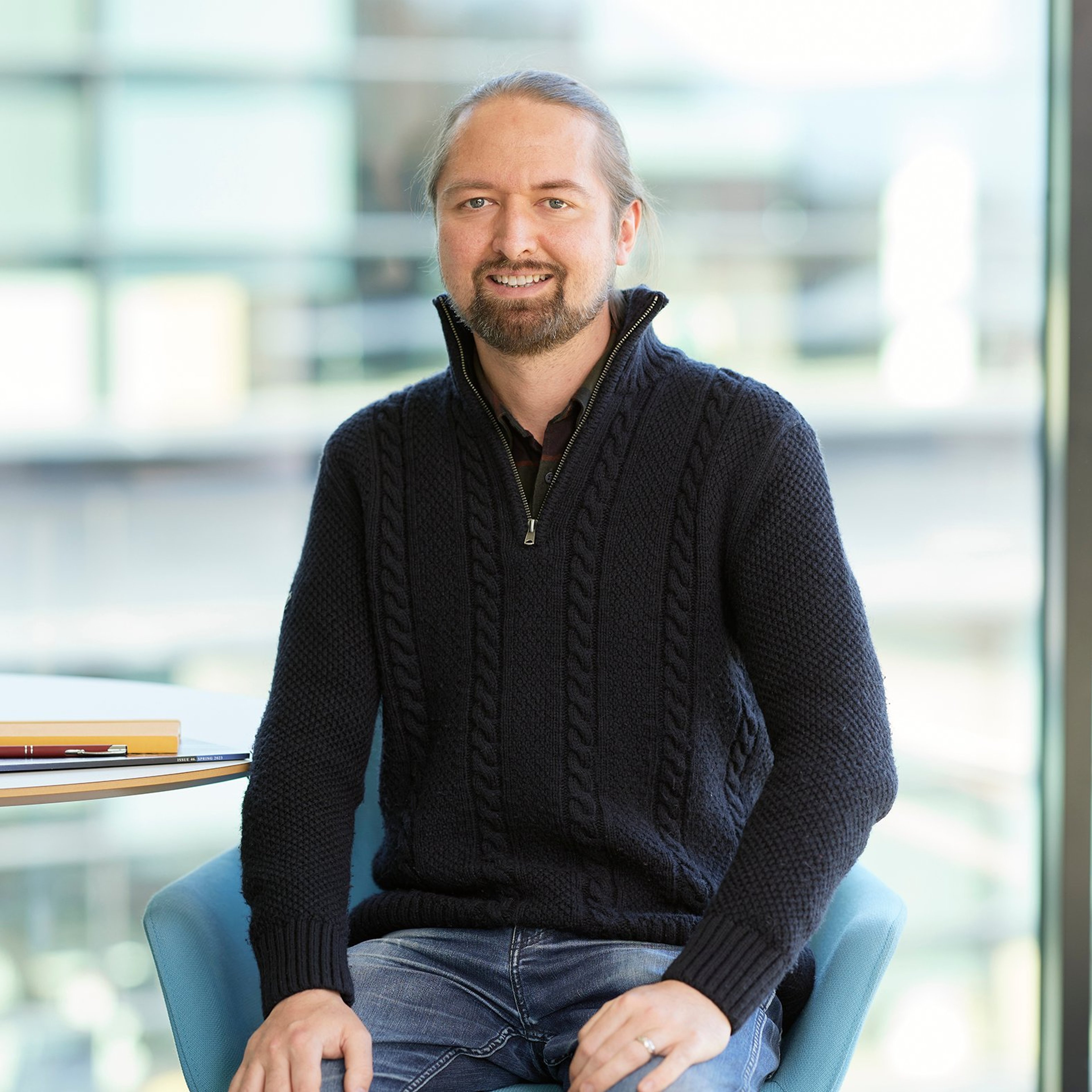

Photography by Duncan Elliott
Your capital may be at risk
According to Eric Beinhocker, the wealth of nations stems not from growing GDP but from the success of companies adapting to address our problems. Gary Robinson, investment manager in Baillie Gifford’s US Equity Growth team, spoke to the Oxford University-based professor
A career as a software entrepreneur, then a venture capital investor, then a business consultant, taught Prof Eric Beinhocker that his college teachers and textbooks had misled him.
The economy, he found, is not a machine kept in balance by rational behavior. Instead, it’s a dynamic, innovative, evolving system that comprises billions of human impulses, actions and reactions.
Beinhocker’s study The Origin of Wealth (2007) suggests prosperity stems from evolutionary processes very much the same as those governing the natural world. Wealth-creating companies search for new ways to meet customer needs and in the process create new technologies, products and services that continuously change the economic system.
Now director of the Institute for New Economic Thinking at the University of Oxford’s Martin School and a visiting professor at the Santa Fe Institute in New Mexico, Prof Beinhocker is preparing a new book that seeks to redefine the market economy and show how to build a more just and sustainable system.
Gary Robinson: Where did you get your interest in how wealth is created?
Eric Beinhocker: Working with small businesses, I found that that world was hugely dynamic and innovative. The way we made money was not when things were in equilibrium, as the textbooks said, but when they were out of balance and change was happening. It motivated me to explore new ways of describing the economy, which is when I came across the work of the Santa Fe Institute on complex adaptive systems.
GR: What are complex adaptive systems?
Since the 1970s, scientists have observed how systems built up of networks of small units or agents interact and evolve in complex and dynamic ways. Those agents then create higher-level patterns, the way water molecules combine to create a whirlpool. They’re called “adaptive” because the agents can change their behaviors. These complex adaptive systems describe everything from our bodies to biological ecosystems, to the internet and artificial intelligence.
The economy itself fits this description. It contains individuals and firms interacting in lots of complex networks and relationships. These interactions create patterns: booms and busts, inflation, business cycles, unemployment, etc. Understanding how these macro patterns emerge from the bottom up seemed more productive than the traditional top-down view.

Gary Robinson in conversation with Eric Beinhocker in May
GR: How does evolutionary theory help us to think about the economy?
EB: Evolution is a simple process of experimentation where a variety of designs is created, some survive better than others, and the successful designs grow. With organisms, it goes on through variations in their genes followed by selection based on fitness, then reproduction. But the same kind of process goes on in technology.
Take the bicycle. No one type of bicycle will be the best forever. Since Victorian penny-farthings, people have tinkered with different designs. Some worked better than others, and eventually they settled on the design of two wheels, pedals, a chain, etc. But even that’s kept developing and evolving. Today, we have road bikes, mountain bikes, city bikes and ebikes: all variations on that theme.
In such evolutionary systems, there’s a process of niche creation and niche filling. For example, no one knew we needed mountain bikes until enthusiasts in the 1970s came up with that design. A whole new niche was born and then filled by various companies innovating around that design. We see this evolutionary process in every industry, from the proliferation of flavors of potato chips to the race to find applications for AI.
GR: How can companies extend their lifespan in this competitive ecosystem?
EB: Make evolution your friend. Try to harness it inside your organization. Markets are brilliant evolutionary systems in that they foster variety and experimentation between companies. Labor and capital markets provide the talent and funding to scale up the winners – and scale down the losers. But too many companies focus on exploiting whatever niche they’ve been successful in versus exploring for and creating new ones. To do that you need to create internal variety and experimentation, be flexible in moving talent and capital to scale up the future winners, and not be afraid to fail. The key is to fail small and often, and scale up and win big. Hanging on to legacy businesses past their peak is the downfall of many companies. But it’s hard when careers are at stake, and there’s a vested interest in maintaining what’s gone on in the past.
GR: How important is a company’s view of the short-term versus the long-term?
EB: As well as managing the tension between operating well and innovating, durable companies manage the tension of multiple time horizons. They need to “wear bifocals”: If they take their eye off the short term they may not be around for the long term. But if they're able to keep that long term in focus and make the appropriate trade-offs and take investment risks for that longer term it can pay off.

GR: Shifting gears a bit, why did you found the Institute for New Economic Thinking (INET)?
EB: Through the 1990s and 2000s there was a growing sense that standard economics was not up to describing the modern economy, and might even be leading to wrong answers. When the 2008 crisis hit, we saw the standard models fail very badly at central banks and finance ministries. Some of us decided it was time to do something about it. I left consulting to set up INET Oxford to explore how we could make better models of the economy and contribute to solving social and public policy problems. We saw enormous opportunities in incorporating modern computational techniques using the vast quantities of data now available.
GR: Are there trade-offs between maximizing long-term shareholder value and benefits to society?
EB: They don’t automatically go together. I saw this in my consulting work. We did a good job of helping companies maximize shareholder value and become incredibly efficient, but, within that framework, businesses have huge incentives to dump their problems back on society. For example, many large US firms have boosted their profits by keeping wage growth below productivity growth. That may be good for the company’s shareholders and its executives paid with stock options. But that isn’t great for the workers themselves just clinging on, for taxpayers who are supporting those workers with food stamps, nor for other businesses who want those workers to have income to buy stuff from them.
GR: Can you tell us more about your next book?
EB: I’m co-authoring it with Nick Hanauer, a US-based entrepreneur, venture capitalist, and policy innovator. We’re exploring the core theme that economies are built not on survival-of-the-fittest, cut-throat competition but on cooperation. Large-scale cooperation enables us to solve our complex problems. It follows that building trust and fair social contracts in societies is key to creating economic prosperity. Fairness and trust aren’t things we try to create after we get prosperity, they’re a major cause of prosperity. Traditional economics has this backwards. There is a view that things like pollution or social problems are “externalities” where we can clean up the messes left by markets after the fact. We argue that extreme concentrations of wealth, political systems rigged in favor of the powerful, and a degraded environment have corroded trust, perceptions of fairness, and belief in the future – all critical to our future prosperity.
The answer isn’t cleaning up more and bigger messes. It is reworking the system to stop creating the messes in the first place. How we do that is a harder question, but there are a lot of new ideas out there that make us believe it’s not impossible.
Mavericks v the mainstream
The idea of a shape-shifting economy is rooted in the new complexity science of the 1960s and 70s applied in physics, biology, computing and other disciplines.
In the late 1980s, led by Prof W Brian Arthur and others at the Santa Fe Institute, theorists began adapting this way of thinking to economics. Looking to other scientific fields and applying advances in computing power and data, scholars proposed a new conception of economies as dynamic, evolving networks made up of real human beings.
Successive global crises – and failures to foresee them – have moved this controversial re-imagining closer to the mainstream. Now it’s referenced by central bankers and international organizations, including the OECD.
And it’s useful. During the Covid-19 pandemic, a team at INET Oxford, led by Baillie Gifford Professor J Doyne Farmer, built a model that accurately predicted the impact of lockdown on UK GDP. His colleague Eric Beinhocker is a longtime advocate of complexity economics as a tool for addressing inequality, ecological collapse and other pressing problems.
Thinking further
Prof Beinhocker’s perspective gives us a new lens through which to view the complex system that is the economy.
Baillie Gifford’s diversity of thinkers and rigorous in-house specialist research are central to our investment approach. However, we complement our own resources with new insights from authors and academics such as Beinhocker who help us to think distinctively and encourage the flow of new ideas.
Risk factors
The views expressed should not be considered as advice or a recommendation to buy, sell or hold a particular investment. They reflect opinion and should not be taken as statements of fact nor should any reliance be placed on them when making investment decisions.
This communication was produced and approved in September 2024 and has not been updated subsequently. It represents views held at the time of writing and may not reflect current thinking.
Potential for profit and loss
All investment strategies have the potential for profit and loss, your or your clients’ capital may be at risk. Past performance is not a guide to future returns.
This communication contains information on investments which does not constitute independent research. Accordingly, it is not subject to the protections afforded to independent research and Baillie Gifford and its staff may have dealt in the investments concerned.
All information is sourced from Baillie Gifford & Co and is current unless otherwise stated.
The images used in this communication are for illustrative purposes only.
Important Information
Baillie Gifford & Co and Baillie Gifford & Co Limited are authorised and regulated by the Financial Conduct Authority (FCA). Baillie Gifford & Co Limited is an Authorised Corporate Director of OEICs.
Baillie Gifford Overseas Limited provides investment management and advisory services to non-UK Professional/Institutional clients only. Baillie Gifford Overseas Limited is wholly owned by Baillie Gifford & Co. Baillie Gifford & Co and Baillie Gifford Overseas Limited are authorised and regulated by the FCA in the UK.
Persons resident or domiciled outside the UK should consult with their professional advisers as to whether they require any governmental or other consents in order to enable them to invest, and with their tax advisers for advice relevant to their own particular circumstances.
Baillie Gifford International LLC is wholly owned by Baillie Gifford Overseas Limited; it was formed in Delaware in 2005 and is registered with the SEC. It is the legal entity through which Baillie Gifford Overseas Limited provides client service and marketing functions in North America. Baillie Gifford Overseas Limited is registered with the SEC in the United States of America.
116334 10050130

